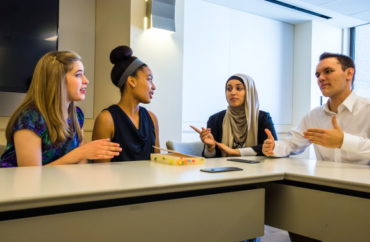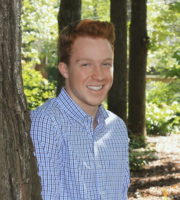
‘I’ve seen these debates work firsthand. We have examples, interviews, anecdotes, but now it’s time to throw it to the science,’ researcher says
Research on the effects of holding debates on college campuses is underway thanks to a major grant that aims to explore what happens when students engage their peers on “polarizing topics” in a civil, guided manner.
The John Templeton Foundation recently awarded the College Debates and Discourse Program a $1.26 million grant to fund a two-year research project that will evaluate the effects of “Braver Angels” debates on students at 10 colleges and universities across the nation.
The Braver Angels debates follow a structured format and use moderators to reduce tensions. Students are encouraged to direct their comments to the moderator instead of other students.
The goal of the debates is to depolarize American politics and encourage Americans to respect their political opponents.
Lindsay Hoffman, associate professor of communication and associate director of the Center for Political Communication at the University of Delaware, said she is grateful for the opportunity to dive deeper into the positive effects of civil debate.
“I’ve seen these debates work firsthand. We have examples, interviews, anecdotes, but now it’s time to throw it to the science,” she told The College Fix in a recent interview.
The 10 participating universities are: Arizona State University, University of Baltimore, Biola University, University of Delaware, Denison University, University of Denver, Duke University, Linn-Benton Community College, Texas A&M – Corpus Christi and Virginia Military Institute.
The College Debates and Discourse Program is an alliance between Braver Angels, the American Council of Trustees and Alumni, and BridgeUSA.
Since its founding in 2018, the College Debates and Discourse Program has launched over 100 Braver Angel debates and engaged more than 5,000 students from over 50 colleges and universities across the United States, according to an ACTA news release.
Hoffman said she plans to center her two-year research project around studying the behavioral outcomes of students who participate in Braver Angels debates.
“We don’t want to study whether students’ opinions changed on certain topics. We want to measure whether students’ attitudes changed after participating in these debates,” Hoffman told The Fix. “Are they more likely to talk to people who have a difference of opinion from them? Are they more likely to be interested in hearing other people’s points of view? These are the questions we’re interested in answering.”
An increasing issue on college campuses perpetuating polarization is the emergence of self-censorship. Polls show that as campus polarization grows, students remain silent and refrain from expressing their true political opinions.
A recent survey of the entire University of Wisconsin system, for example, found 57 percent of students wanted to express their views on a controversial topic but decided to remain silent.
Among the students who self-censor, 61 percent said they were concerned other students would disagree with them, and 58 percent worried their views would be dismissed as offensive.
Doug Sprei, vice president of multimedia and campus partnership at the American Council of Trustees and Alumni, said he believes Braver Angel debates are crucial to combating self-censorship.
“There’s plenty of research out there that says college students self-censor when it comes to expressing their political views. The debates seem to be a complete antidote to self-censorship,” Sprei told The Fix. “Braver Angels debates intersect fully with the College Debates and Discourse Program’s mission of free speech and academic freedom.”
Sprei said he hopes the research provides hard evidence the Braver Angels debates are working.
“We know from having done many debates and working with so many students that these debates have a profound impact. The research is going to help us quantify that impact, explore it in detail, and make a granular report to the higher education community,” Sprei told The Fix.
“We’re going to use this research to determine how we can inculcate practice around dialogue, debate, academic freedom, viewpoint diversity, and open inquiry on college campuses. There’s a real need for these debates, and there’s no end in sight to the demand. The future of these debates is unlimited.”
MORE: Pressing forward with college debates in a time of COVID and cancelation
IMAGE: Photo Stock World / Shutterstock





Please join the conversation about our stories on Facebook, Twitter, Instagram, Reddit, MeWe, Rumble, Gab, Minds and Gettr.